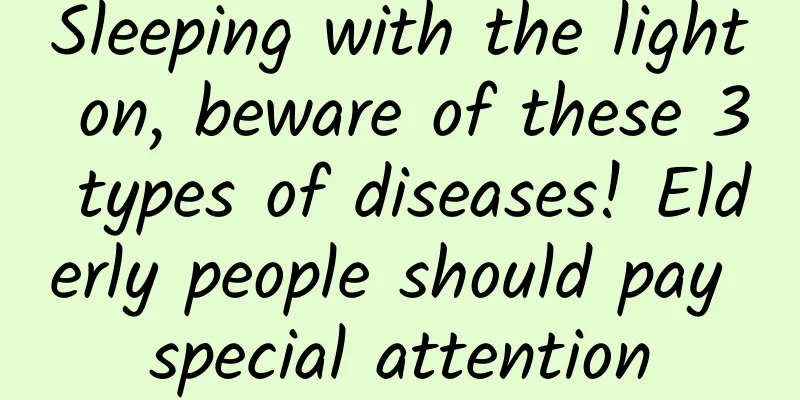Sleeping with the light on, beware of these 3 types of diseases! Elderly people should pay special attention

|
Some people like to fall asleep slowly in a dark environment, while others are used to sleeping with the lights on. However, different sleeping habits may have different effects. Did you know that keeping your bedroom dark when you sleep not only helps you get a good night's sleep, but may also reduce the risk of obesity and cancer. Studies have shown that people who are accustomed to being exposed to light during sleep have a higher prevalence of obesity. Recently, a new study published in the journal SLEEP showed that compared with adults who are not exposed to any light at night, older adults (63 to 84 years old) who use night lighting or place TVs, smartphones or tablets in the room may be more likely to be obese and have a greater chance of developing high blood pressure and diabetes. This was a real-world (nonexperimental) study of participants who were originally enrolled in the Chicago Heart Association Industrial Monitoring Program (CHA) conducted from 1967 to 1973. This was a public health program and epidemiological study that performed a detailed evaluation of known risk factors for heart disease. From about 2007 to 2010, researchers at Northwestern University conducted a separate Chicago Healthy Aging Study. Some participants from the original CHA study were included in the new project. Participants in the study underwent detailed examinations and filled out daily sleep diaries. Light exposure in the bedroom was measured via a device worn on the participants' wrists and tracked for seven days. The study found that among 552 participants with an average age of 72 years, 410 (74%) and 128 (23%) participants completed valid activity records for 7 days and 6 days respectively, and the remaining 14 participants (2.5%) completed valid activity records for 5 days. Less than half of the participants slept in total darkness for five hours. The rest of the participants were exposed to some light even during the darkest five hours of the day, which is usually when they go to bed at night. Compared with the group of participants who were not exposed to light, in terms of sleep variables, the participants in the group exposed to light at night had shorter total sleep time, shorter time in bed, longer wake-up time after sleep, and lower sleep efficiency. In addition, in the variable analysis, it was found that participants in the night light exposure group were more likely to have health problems such as obesity (41% vs 27%, p<0.001), diabetes (18% vs 9.8%, p=0.007) and hypertension (73% vs 59%, p<0.001). No significant difference was found in the prevalence of hypercholesterolemia between the two groups (59% vs 65%). Studies have shown that exposure to light at night may increase the risk of two of the most common chronic diseases worldwide, obesity and diabetes; it may also increase the risk of high blood pressure, a major risk factor for cardiovascular disease. "We live in an environment with a lot of artificial light 24 hours a day, whether it's using smartphones, leaving the TV on all night, or light pollution in big cities," said Minjee Kim, assistant professor of neurology at Northwestern University Feinberg School of Medicine and senior author of the study. "Older adults are at higher risk for diabetes and cardiovascular disease, so we wanted to see if the incidence of these diseases was associated with nighttime light." He further noted that "even small amounts of light at night can be harmful to health." "It's really important for people to avoid or minimize light exposure while they sleep," said co-corresponding author Phyllis Zee, MD, director of the Feinberg Center for Sleep Medicine. Emerson Wickwire, professor and chair of the department of sleep medicine at the University of Maryland School of Medicine, noted that this study adds to growing scientific evidence showing the importance of the body's biological clock and sleep to overall health, especially in older adults. How to reduce light and sleep better? The research team gave the following suggestions on how to minimize bedroom light to improve sleep quality and avoid these three health problems: Don't sleep with a light on. If you need to sleep with a light on for safety reasons, use a low-profile light that's close to the ground. Choose the right lamp and pay attention to the color of the light. Amber or red/orange light is less stimulating to the brain. Avoid white or blue lights and place it away from the bed. If you cannot control the outdoor light, to prevent the light in the bedroom from being too bright, you can use a blackout shade or wear an eye mask when sleeping. Pay attention to the placement of the bed so that outdoor light does not shine on your face. References [1] Minjee Kim, Thanh-Huyen Vu, et al., (2022). Light at night in older age is associated with obesity, diabetes, and hypertension. Sleep. DOI: https://doi.org/10.1093/sleep/zsac130 [2] Steven Reinberg. Light in your bedroom is no good for your health. Medical Xpress. Retrieved JUNE 22, 2022, from https://medicalxpress.com/news/2022-06-bedroom-good-health.html [3] Northwestern University. Light during sleep for older adults is linked to obesity, diabetes, high blood pressure. Medical Xpress. Retrieved JUNE 27, 2022, from https://medicalxpress.com/news/2022-06-older-adults-linked-obesity-diabetes.html |
<<: World Breastfeeding Week丨Do I need to reduce breast milk when adding complementary foods?
>>: Acupoints for health care | Sore throat: Massage Shaoshang and Zhaohai to relieve pain
Recommend
Will the pelvis become wider after a normal birth?
Many women are distressed because they find that ...
Is it okay to eat your own placenta?
The placenta is not only the source of food suppl...
Normal cervicovaginal epithelium is
The normal cervix is smooth and composed of thr...
How to clear milk stasis lumps
If milk accumulates and clumps, the milk cannot c...
Rumors debunked online! The incubation period of rabies does not last for more than ten years, but there is still a risk of infection from being licked or scratched!
Recently, the news of passers-by being bitten by ...
Hyperuricemia: A battle with "acid"
With the improvement of living standards, people&...
What to do if you are irritable during menstruation
In fact, as women all know, every time you have y...
Why can't we eat too much pork liver? The nutritional value of pork liver
Pork liver contains 18 times more iron than pork,...
Standard weight for girls 155 cm tall
Contemporary women's fashion pursues a perfec...
What are the different states of hepatitis B infection? What will be the outcome? Can it be cured on its own? The doctor will tell you
We come to this world and walk around, and eventu...
What should girls pay attention to when they grow up?
Adolescence is a green but awkward period. With t...
When is the best age for women to have children?
Due to age, illness, and lack of maintenance, the...
Here are the top 10 hot questions and answers for current epidemic prevention
Source: People's Daily Client...
How can women exercise to tighten their vagina?
There are also many women in life who have this c...









